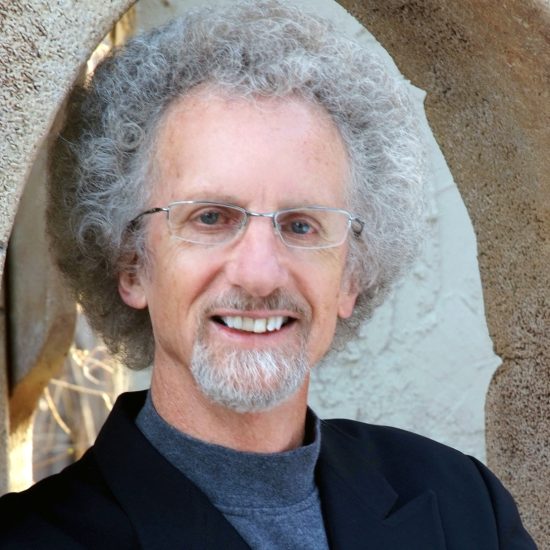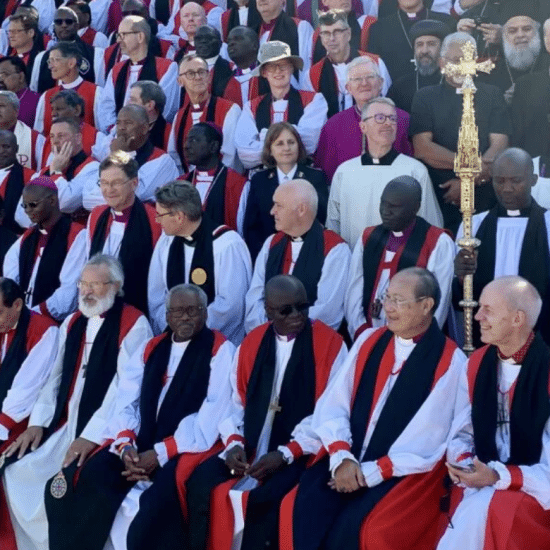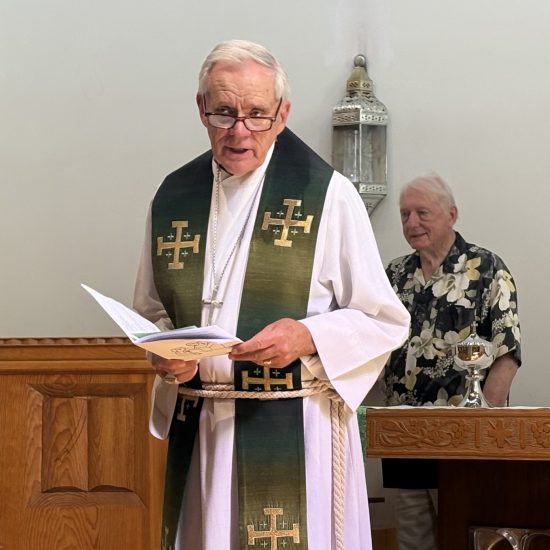NASHVILLE (BP) — About one in four Americans say they are evangelical Christians. Most of them are white, live in the South and identify as Republican. Many go to church every week.
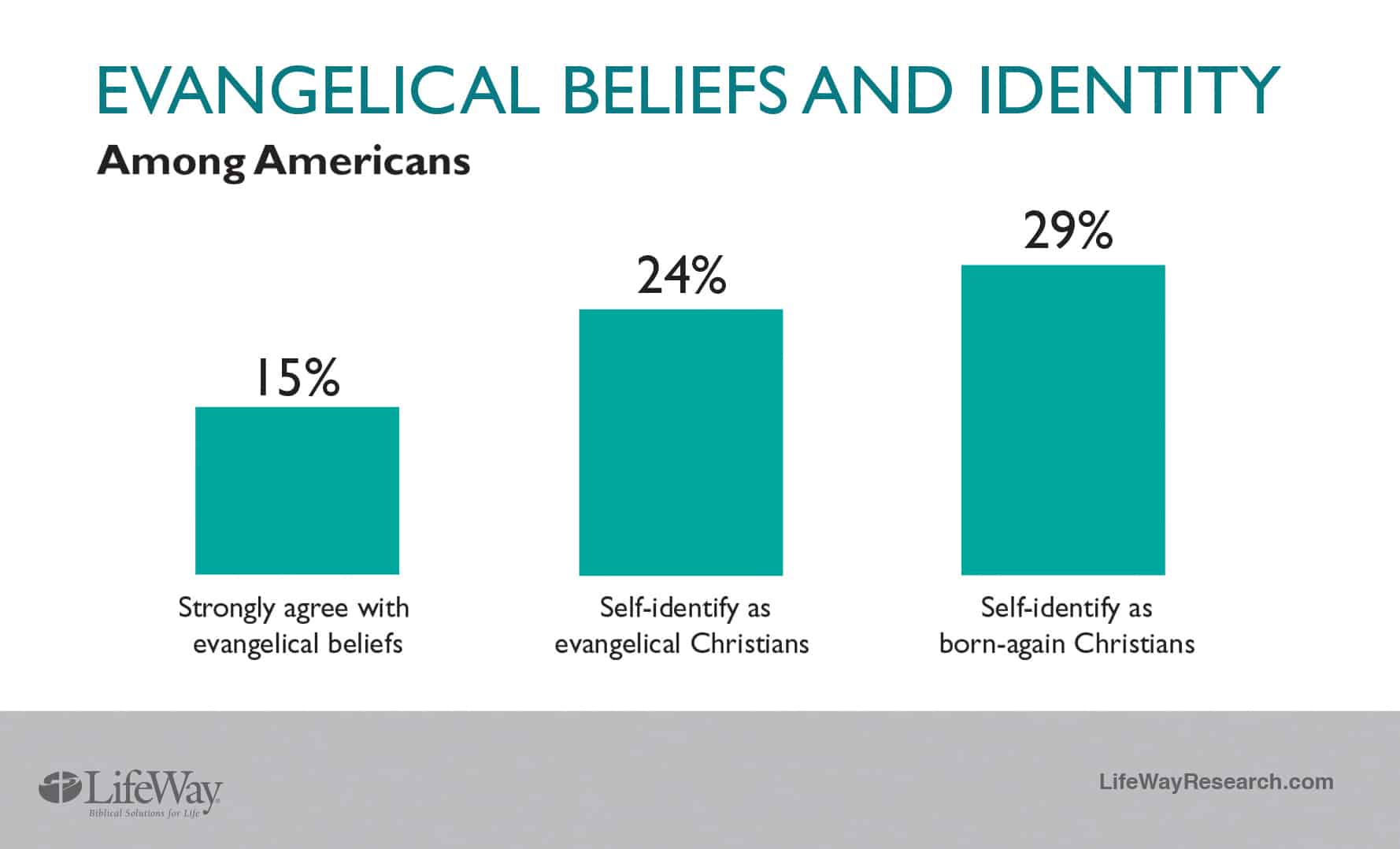 But they’re not always sure what they believe.
But they’re not always sure what they believe.
Fewer than half of those who identify as evangelicals (45 percent) strongly agree with core evangelical beliefs, according to a survey by LifeWay Research released Dec. 5.
“There’s a gap between who evangelicals say they are and what they believe,” said Scott McConnell, executive director of LifeWay Research, based in Nashville.
And a significant number of evangelical believers reject the term “evangelical.” Only two-thirds (69 percent) of evangelicals by belief self-identify as evangelicals.
Beliefs & belonging
For the past few years, LifeWay Research has been looking at the intersection of belief and belonging in the evangelical movement.
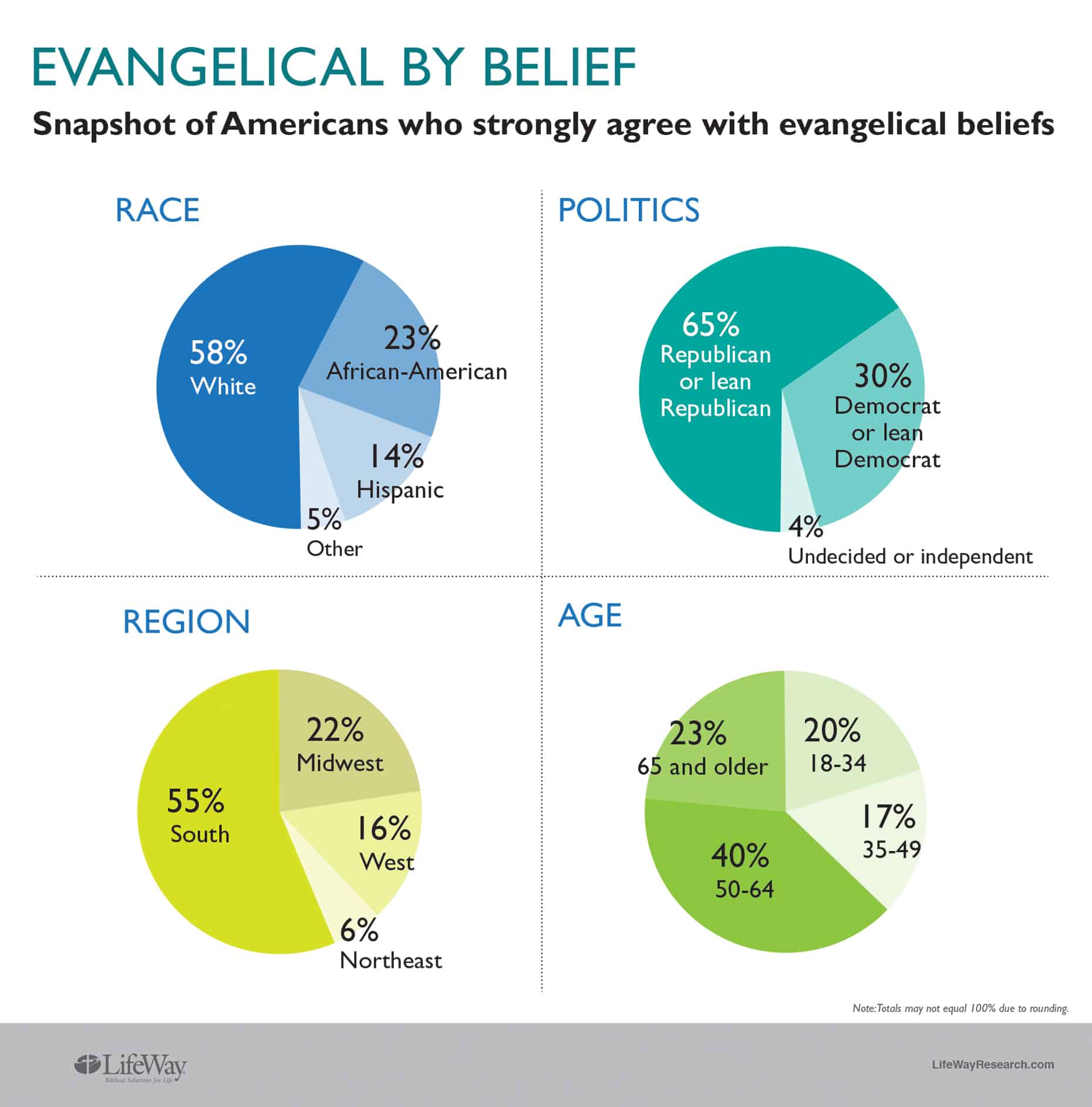 Some research studies define “evangelical” by self-identification, with respondents picking from a list of religious traditions. Others categorize people as evangelical by the churches they identify with.
Some research studies define “evangelical” by self-identification, with respondents picking from a list of religious traditions. Others categorize people as evangelical by the churches they identify with.
In this new survey, LifeWay used a set of four questions about the Bible, Jesus, salvation and evangelism developed in partnership with the National Association of Evangelicals. Those who strongly agree with all four are considered to be evangelicals by belief.
Fifteen percent of Americans are evangelicals by belief, according to LifeWay Research. By contrast, 24 percent of Americans self-identify as evangelicals.
Researchers found some significant differences between the two groups.
Evangelicals by belief are more diverse than self-identified evangelicals. Fifty-eight percent, from the standpoint of beliefs, are white, 23 percent are African American and 14 percent are Hispanic. Five percent claim another ethnicity.
By contrast, 70 percent of self-identified evangelicals are white; 14 percent are African Americans; 12 percent are Hispanic; and 4 percent claim another ethnicity.
Evangelicals by belief go to church more often. Seventy-three percent say they attend services once a week or more. That drops to 61 percent for self-identified evangelicals.
Evangelicals congregate in the South
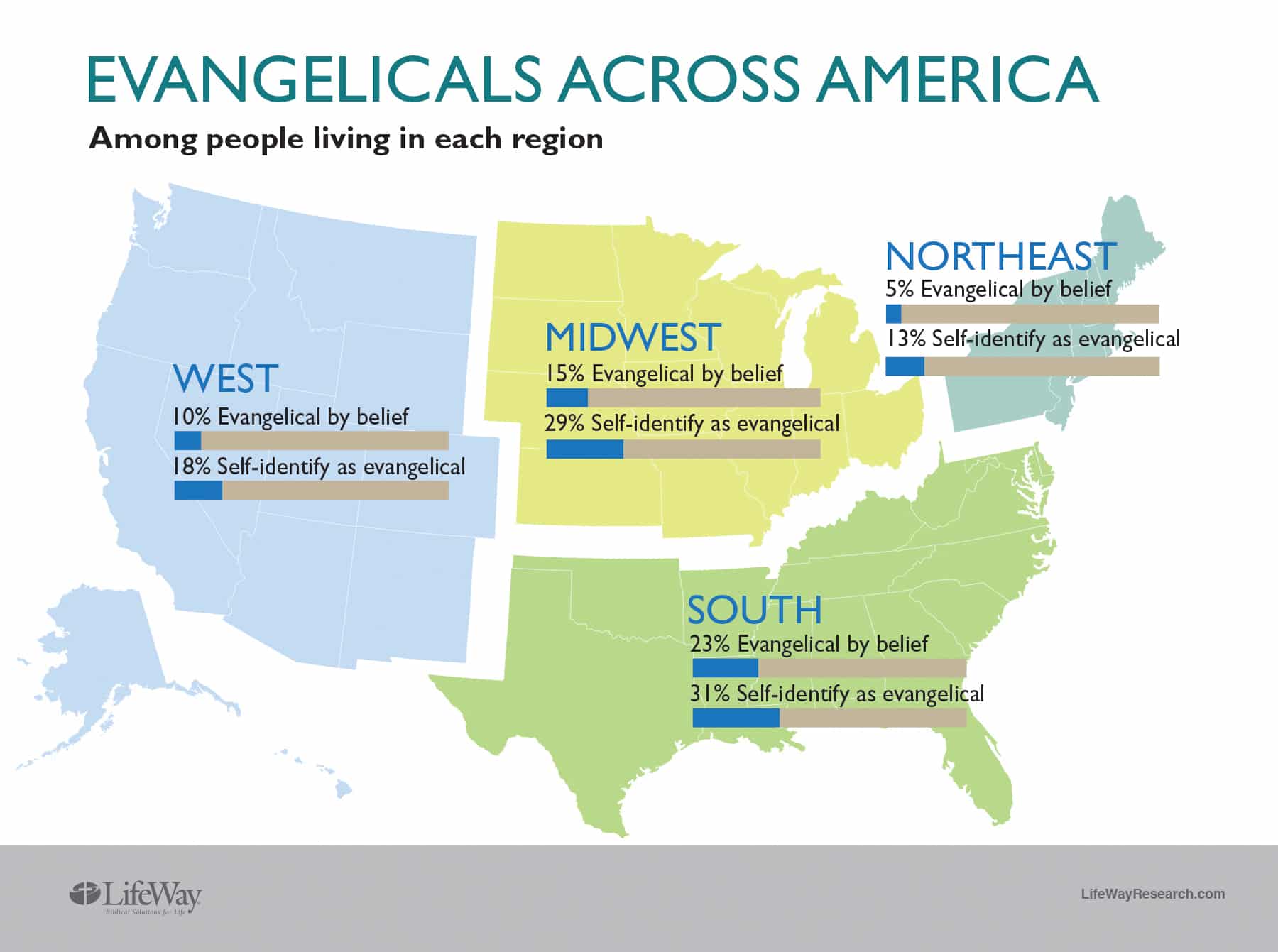 The two groups of evangelicals share some similarities. About half are Southerners. Most are Republicans.
The two groups of evangelicals share some similarities. About half are Southerners. Most are Republicans.
Just over half (55 percent) of evangelicals by belief live in the South; 22 percent are in the Midwest; 16 percent in the West; and 6 percent in the Northeast.
Among self-identified evangelicals, 48 percent live in the South; 25 percent in the Midwest; 17 percent in West; and 9 percent in the Northeast.
“If you are an evangelical who lives in the South, you’re often going to run into people who believe the same things you do,” McConnell said. “In the Northeast, you’re often going to feel alone.”
Two-thirds of evangelicals by belief (65 percent) are Republicans or lean Republican while 30 percent are Democrats or lean Democratic and 4 percent are undecided or independent.
Among self-identified evangelicals, 64 percent are Republicans or lean Republican; 33 percent are Democrats or lean Democratic; and 3 percent are undecided or independent.
Both groups also tend to be older, with 31 percent of Americans 65 and older identifying as evangelicals. That drops to 22 percent among those 18 to 34. Meanwhile, 19 percent of those 65 and older hold evangelical beliefs, dropping to 10 percent for those 18 to 34.
The more education Americans have, the less likely they are to be evangelicals of either type. A quarter of Americans with a high school diploma or less (26 percent) or some college (28 percent) identify as evangelicals, whereas 18 percent of those with a bachelor’s degree say they are evangelicals.
Americans with some college (20 percent) are more likely to have evangelical beliefs than those with a bachelor’s degree (9 percent) or graduate degree (12 percent).
Some of the results surprised McConnell, especially when it came to politics. He expected more political differences between the two types of evangelicals.
“The political differences between them turn out to be very small,” he said.
LifeWay Research also asked if politics played a role in whether Americans identify as evangelicals. It appears that few evangelicals shun the term because of its political implications.
When asked, “If the term had nothing to do with politics, would you consider yourself an evangelical Christian?” one in four Americans say yes — almost identical to the number of who identify as evangelicals without any political qualifications.
McConnell suspects that party affiliation and race play a bigger role in how people vote than faith does.
“Evangelical religious beliefs by themselves do not explain political behavior,” he said. “Ethnic group is a better predictor of political behavior, but the best predictor of voting patterns is one’s political party identification.”
Born-again Americans a diverse crowd
The term “born again” has often been used as a synonym for self-identified evangelicals. LifeWay Research found some overlap between the two groups.
Two-thirds (66 percent) of self-identified born-again Americans say they are evangelicals. That remains true even if the term evangelical didn’t have political implications (67 percent).
Like self-identified evangelicals, fewer than half (45 percent) hold evangelical beliefs. And they are less likely (56 percent) to attend services once a week or more than either type of evangelicals.
Born-again Americans have more political parity than either type of evangelicals. Fifty-six percent are Republican or lean Republican; 39 percent are Democrats or lean Democratic; and 5 percent are undecided or independent.
African American Christians appear to find the term “born again” more appealing than “evangelical.”
African Americans are more likely to say they are born again (49 percent) than whites (27 percent), Hispanics (24 percent) or those from other ethnicities (19 percent).
African Americans are also the most likely to have evangelical beliefs (30 percent). Whites (13 percent), Hispanics (13 percent) and those from other ethnicities are less likely (9 percent). African Americans (30 percent) and whites (26 percent) are more likely to say they are evangelical than Hispanics (18 percent) or those from other ethnicities (11 percent).
McConnell said some research groups in the past limited the term “evangelical” to white Christians. Others have focused on white evangelical voters — which has left out other ethnic groups.
“For many African Americans, the term ‘evangelical’ is a turn-off, even though they hold evangelical beliefs,” McConnell said. “The term ‘evangelical’ is often viewed as applying to white Christians only. And that’s unfortunate. It’s lost some of its religious meaning that actually unites these groups.”
Methodology:
LifeWay Research conducted the study Nov. 10-12, 2017. The survey was conducted using the web-enabled KnowledgePanel, a probability-based panel designed to be representative of the U.S. population. Initially, participants are chosen by a random selection of telephone numbers and residential addresses. People in selected households are then invited by telephone or by mail to participate in the web-enabled KnowledgePanel. For those who agree to participate but do not have internet access, GfK provides at no cost a laptop and ISP connection.
For this survey, a nationally representative sample of U.S. adults (18 and older) was selected from the KnowledgePanel. Sample stratification and base weights were used for gender, age, race/ethnicity, region, metro/non-metro, home ownership, education and income to reflect the most recent U.S. Census data. Study-specific weights included for gender by age, race/ethnicity, region and education to reflect 2016 General Social Survey data. The completed sample is 1,000 surveys. The sample provides 95 percent confidence that the sampling error does not exceed plus or minus 3.1 percent. Margins of error are higher in subgroups.
Evangelical beliefs are defined using the NAE LifeWay Research Evangelical Beliefs Research Definition based on respondent beliefs. Respondents are asked their level of agreement with four separate statements using a four-point, forced-choice scale (strongly agree, somewhat agree, somewhat disagree, strongly disagree). Respondents are categorized as having evangelical beliefs if they strongly agree with all four statements:
— The Bible is the highest authority for what I believe.
— It is very important for me personally to encourage non-Christians to trust Jesus Christ as their Savior.
— Jesus Christ’s death on the cross is the only sacrifice that could remove the penalty of my sin.
— Only those who trust in Jesus Christ alone as their Savior receive God’s free gift of eternal salvation.
LifeWay Research is a Nashville-based evangelical research firm that specializes in surveys about faith in culture and matters that affect churches.

